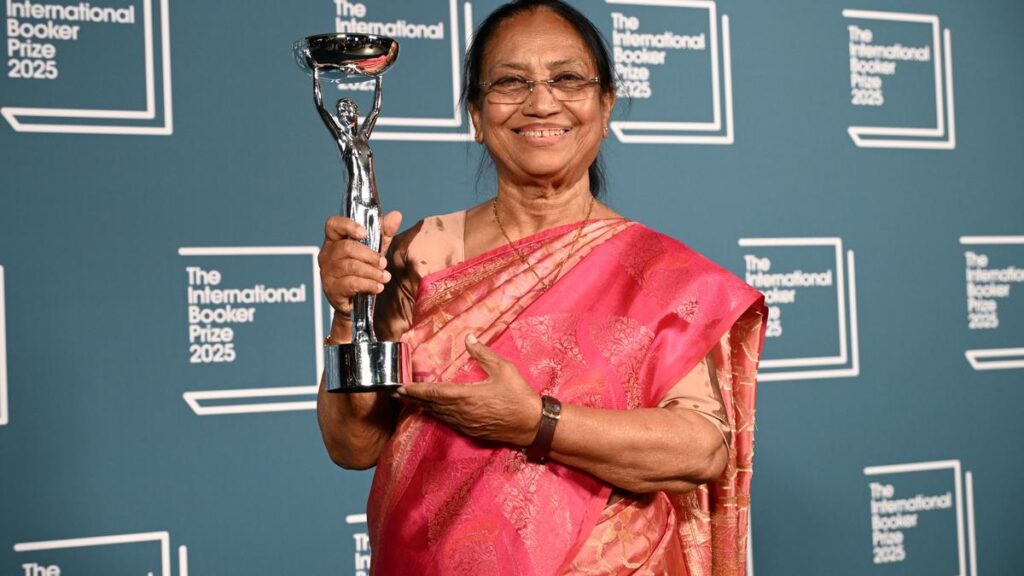
Banu Mushtaq, author of “Heart Lamp” and winner of The International Booker Prize 2025 at the Tate Modern on May 20, 2025 in London
| Photo Credit: Getty Images
Banu Mushtaq, eminent short story writer and Booker awardee for 2025, is a writer-activist deeply concerned with gender inequalities and the patriarchal violence which is invisibalised by religion and tradition.
In retrospect, her major concerns and her passionate rebellious stance seem to have emerged from the Bandaya (protest) movement in Kannada literature in the 1970s and the 1980s. This was also the time which saw the coming into maturity of the second generation of women writers who discovered their authentic voices in the midst of the churming created by the people’s movements in Karnataka.

The phenomenal Lankesh Patrike, a weekly tabloid edited by P. Lankesh, also proved to be a platform for writers who emerged as the major representatives of women-centric fiction and non-fiction writings. Banu also doubled as a reporter for the tabloid from Hassan where she worked as a lawyer.
Keen eye for the ordinary
Expectedly, she was drawn into controversies over her no-holds-barred reports. These experiences which shaped her added depth and objectivity to her sensitive understanding of the lives of Muslim women. Her short stories are written with a sense of engagement and empathy with the uncomplaining, silenced victims of moribund customs. What makes her stories distinctive is her patient attention to the details of the ordinary lives of women.
Scholar-writer-critic Rajendra Chenni.
| Photo Credit:
Special arrangement
At times, the narrative voice in her stories resorts to rhetoric and raw anger, but her better stories haunt the readers with the depiction of wasted and unlived lives. But the stories are also about resilience and the small acts of defiance and resistance. Most certainly, the stories do not aim at appealing to the sympathy of the readers.
Blending irony with emotion
In one of her stories, the last prayer is for God to be born as a woman: this led to a public controversy, with some orthodox individuals demanding her excommunication. Incidentally, the prayer is often repeated in women’s writing in Kannada. It is a devastating story showing how male domination, lust, and greed subject women into servitude. Tragically, this is so normalised that no one takes notice. The protagonist can only pray to God once, to ‘be a woman once, Oh lord’ in case he is planning to create another world.
Hassan Karnataka 26/02/2025
For INFOCUS
Literary works of Banu Mushtaq, writer and advocate in Hassan. Photo by Prakash Hassan
| Photo Credit:
PRAKASH HASSAN
Stone Slabs for Shaista Mahal is an example of how Banu can blend irony with powerful feelings. Shaista, whose husband had waxed poetic, promising to build Shaista Mahal as a monument of his love for her, marries a young girl on the fortieth day after her death. Yes, Mahals are built as beautiful graves for dead wives.
In Black Cobras, the story on which Girish Kasaravalli made an extraordinary film, the wife is turned away with her three girl children because the husband, an auto rickshaw driver, wants a male child to take up his profession later. The mutaavali, a corrupt and insensitive man supports the husband. He is one of those misinterpreting religion against women. Unlike the helpless protagonist, the mutaavali’s wife decides not to be a childbearing machine for her hypocritical husband any longer.

Deconstructing stereotypes
Banu, as a short story writer, is an accomplished narrator and manages to employ the traditional elements of storytelling to communicate a devastating portrayal of how patriarchy operates, taking advantage of the multiple pressures on women to conform. Women’s writing has treated the domestic sphere as a site for examining subjugated women who do not possess the agency to question, nor the material conditions to live independently.
Banu probes into this bleak world, at times almost suggesting that there is no exit. Her stories powerfully deconstruct the stereotypes about safe, protected domesticity and of marriage as companionship. What emerges is the troubling insight that only foundational changes in society can undo gender inequality.
Published – May 21, 2025 04:43 pm IST
Source:https://www.thehindu.com/news/national/karnataka/banu-mushtaq-a-voice-of-empathy-and-resilience/article69601339.ece

